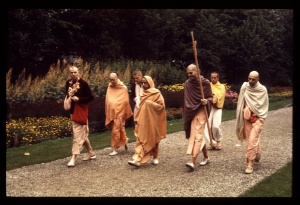BG 5.24 (1972)

A.C. Bhaktivedanta Swami Prabhupada
TEXT 24
- योऽन्तःसुखोऽन्तरारामस्तथान्तर्ज्योतिरेव यः ।
- स योगी ब्रह्मनिर्वाणं ब्रह्मभूतोऽधिगच्छति ॥२४॥
- yo 'ntaḥ-sukho 'ntar-ārāmas
- tathāntar-jyotir eva yaḥ
- sa yogī brahma-nirvāṇaṁ
- brahma-bhūto 'dhigacchati
SYNONYMS
yaḥ—one who; antaḥ-sukhaḥ—happy from within; antaḥ-ārāmah—active within; tathā—as well as; antaḥ-jyotiḥ—aiming within; eva—certainly; yaḥ—anyone; saḥ—he; yogī—mystic; brahma-nirvāṇam—liberated in the Supreme; brahma-bhūtaḥ—self-realized; adhigacchati—attains.
TRANSLATION
One whose happiness is within, who is active within, who rejoices within and is illumined within, is actually the perfect mystic. He is liberated in the Supreme, and ultimately he attains the Supreme.
PURPORT
Unless one is able to relish happiness from within, how can one retire from the external engagements meant for deriving superficial happiness? A liberated person enjoys happiness by factual experience. He can, therefore, sit silently at any place and enjoy the activities of life from within. Such a liberated person no longer desires external material happiness. This state is called brahma-bhūta, attaining which one is assured of going back to Godhead, back to home.